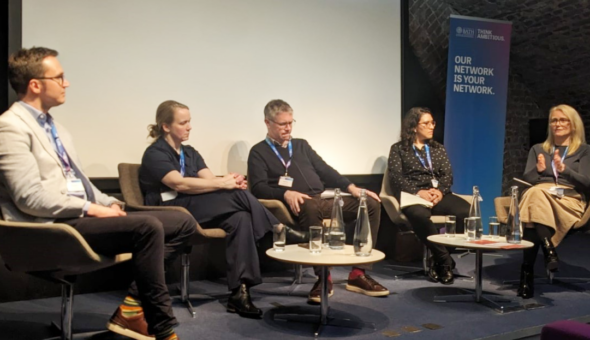The Centre for Business, Organisations and Society at the University of Bath School of Management is fortunate to have an international network of affiliate and associate members, who contribute to the breadth, depth and quality of our work. They do so through visits, joint research projects, feedback on papers or simply through informed discussions over a coffee. We spoke with Professor Jenn Griffin, of Loyola University Chicago’s Quinlan School of Business.
Tell us a bit about your current role, and the path that took you there
My current role is the Raymond C. Baumhart SJ Professor of Business Ethics and Professor of Strategy. I started out as a chemical engineer working for GE Plastics in manufacturing, R&D and applied marketing. Then, returned to school for an MBA, as well as a doctorate before landing my current “too good to be true” job after more than 20 years in academia.
My career trajectory has transitioned from examining chemical processes to examining decision processes. I made the decision to move from the corporate world into academia after a very senior executive in GE Plastics asked me two great questions. I was working in The Netherlands on converting a chemical process to a continuous reaction, creating a triple win – we increased productivity, increased yield, and decreased methylene chloride (a CFC). And my boss asked two questions; what’s the business case for making this process change throughout the organisation? And what’s the regulatory motivation? My response was a leadership-based reply: because we can. So, I’ve explored market motivations, and government mandates alongside values-based leadership as motivators for organisational change.
What are you working on at the moment?
In general, my research looks at how organisations continuously co-create value. I have a couple of projects going on at the moment, which all tie together.
I’m looking at the mechanism of CSiR (Corporate Social irResponsibility), as well as the mechanism of Corporate Social Responsibility (CSR). Interestingly our findings show that the mechanisms driving irresponsible behaviour (or mitigating irresponsible behaviours), are very different than the mechanisms driving prosocial behaviour that might lead to growth, innovation or offering new products in new markets. Risk tolerance, for instance. We found that financial risk-taking firms are perhaps hedging climate change risk, by voluntarily undertaking beyond compliance, prosocial climate change-based activities.
I’m really excited about my second project that looks at Environmental, Social and corporate Governance (ESG) challenges and in particular, examining environmental and social activity, across different forms of governance. Under what different governance conditions might a firm’s ‘E’ and ‘S’ activities change? So, examining family firms versus non-family firms, as one type of different governance structures or listed companies versus non-listed company. I’m looking at different country contexts such as chaebols, for example or Indian family firms which is especially interesting as you need to factor in the different environmental and social expectations at the national level as well as the firm’s behaviour or activity.
My third project is linked to the second. I’m looking at ESG activities within India specifically, because they are making CSR mandatory for certain sized businesses. How, for example, are businesses (such as Bisleri, Pepsi or Coca-Cola) choosing to voluntarily undertake ESG activities, such as recycling PET bottles (made of polyethylene terephthalate), by partnering with organisations and entrepreneurs in the informal sector to pre-empt government directives regarding PET waste that PM Modi is proposing?
What are you hoping to achieve through the work that you do, in terms of the social impact of you work?
I talk about this in my book, Managing Corporate Impacts: Co-Creating Value, which won the Academy of Management 2017 Best Book Award. One thing I want to challenge is the mindset that effective CSR is merely a post hoc give-a-way. I hope to change the landscape so that organisations thoughtfully consider and implement actions jointly with stakeholders, by continually experimenting in a design thinking, data-informed, values-based way to intentionally create positive outcomes. The social expectations of business are unpredictable, mercurial, and ever-increasing so a forward-looking, communal approach to value co-creation is becoming increasingly essential.
What are you most proud of in your career so far?
The conversations I have in the classroom, in boardrooms, workshops and in discussion with others are the best part of my job/career. Whether in conversation with undergrads, graduate students, doctoral students, alumni, colleagues or executives, my focus is on creating better questions. I see my research as a continuous conversation, where academics and scholars provoke as well as respond to the changing issues that practitioners have, developing more insightful, helpful questions to explore. I try and build a multi-disciplinary perspective into our conversations – ensuring we stay responsive to the practical drivers of businesses and real problems when developing theory.
How do you manage that - to continually ask new questions, and to respond to the needs of organisations?
By working in an interdisciplinary way. I’ve worked with a lot of different co-authors, from the areas of political science, environmental science and marketing. The academic community is so rich, with people of different backgrounds, experience and expertise. Their pathways to academia are all different and it’s an incredible resource to draw on. If you’re looking at developing solutions oriented outcomes, or research that focuses on impact, you need to be having interdisciplinary conversations to generate the best questions.
Who has been your biggest inspiration or influence?
It’s an unusual response, but my grandmother! She was this independent, fiery woman, who used to sit at the head of the dining room table and command the conversation. With lots of laughter! She had really strong values and a hands-on approach. She was a great listener – you’d sit down with her and she’d say “come on, tell me more about that”. Maybe that’s where I got my interest in asking questions!
If you weren’t an academic, what would you be?
This is another unusual answer. Back in the day I taught scuba diving! I had a real passion for it, and if my life had gone another way, I would probably have ended up owning and operating a scuba diving shop. Scuba diving was actually how I got into teaching! I enjoyed it so much and it gave me so much confidence to be in front of others– I used to be the person who would sit in the back of the room really quiet and shy – and teaching scuba diving completely changed that. It was a very hands-on, practical experience of teaching so in some ways a pathway to what I’m doing now.
What advice would you give to someone who wants an academic career?
The same advice I give to anyone, which is: find your passion. What gets you out of bed every day? Find out what motivates you and go after it. If that is what leads you to an academic career of exploring ideas, then great. But there are lots of interesting debates and discourse to be had in lots of different professions – academia isn’t the only route to good conversations and pursuing your passion.
Respond



